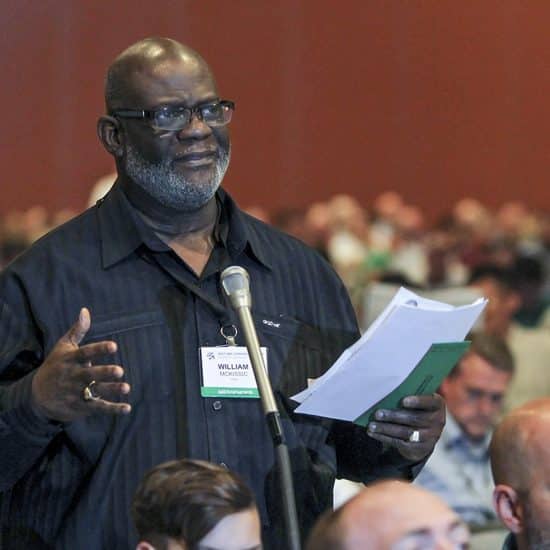MEMPHIS, Tenn. (ABP) — The head of the Southern Baptist Convention International Mission Board welcomed a recent progress report by a Great Commission Task Force as a "token" step toward redistributing more resources to the denomination's primary task of reaching the lost in a report to IMB trustees March 2.
Jerry Rankin, who retires in July after 17 years as president of the SBC entity devoted to appointing and supporting international missionaries, said that in his consultation with the task force he emphasized the need to invest more money into reaching an estimated 6 billion unreached people in thousands of ethnic groups around the world.
Rankin called one recommendation of the group appointed last summer to study effectiveness of the nation's second-largest faith group — increasing the International Mission Board's allocation of the Cooperative Program unified budget from 50 percent to 51 percent while reducing the SBC Executive Committee allocation by 1 percent — "a token commitment in that direction."
While the shift would add about $2 million a year at current funding levels to IMB coffers, Rankin said it is more significant that for the first time, the "50 percent barrier has been broken" in the proportion of total funds allocated to international missions.
"Whenever relative needs of state conventions or various SBC entities are discussed in budget forums or other contexts, IMB is dismissed from the discussion with the comment, 'They already get half of the CP funds, plus all those Lottie Moon Christmas Offering funds,'" Rankin told IMB trustees meeting in Memphis, Tenn.
The implication, Rankin said, is "that no more consideration needs to be given to the needs of international missions." While he said he recognizes a prevailing concern in Southern Baptist life for reaching America, evangelizing under-churched cities and reversing a decline in baptisms, the mission chief said such thinking ignores "the relative size of the assigned tasks" and the fact that 97 percent of dollars collected by the denomination's 45,000 churches remain in North America.
"It comes down to a decision of whether or not Southern Baptists want to settle for sending and supporting 5,000 missionaries or to provide the resources to do what it takes to be aligned with God's vision and mission in reaching the nations," Rankin said.
The last time the SBC restructured, in 1997, Rankin said, several entities were eliminated and their functions consolidated under the premise that a streamlined structure would result in more money for missions. What actually happened, he said, is that total allocations for missions were reduced, while budgets of the Ethics & Religious Liberty Commission and Executive Committee grew.
Rankin said reducing the Executive Committee allocation by 1 percent would represent "a sizeable portion" of its budget, but he pointed out that in recent years the convention has allowed the committee's role to expand beyond providing administration and facilitating services.
The Executive Committee currently oversees self-adopted ministry assignments like Empowering Kingdom Growth, a spiritual renewal program for individuals and churches led by Ken Hemphill, former president of Southwestern Baptist Theological Seminary. Another is Global Evangelical Relations, an office led by former SBC president Bobby Welch formed to maintain relations with like-minded Baptists around the world after the SBC pulled out of the Baptist World Alliance in 2004.
Gordon Fort, the IMB's vice president for global strategy, described the SBC's reason and vision for churches cooperating together as "one sacred cause, to reach a lost world with the gospel."
Yet Fort questioned the sincerity of that commitment in a system where out of more than $12 billion collected last year in Southern Baptist churches, a little over 2 percent made its way to fund missions.
'If we as IMB promote the cause of global mission to the local church and we as IMB try to articulate the truth of what is happening with their Cooperative Program dollars, we are chastised if we encourage the local church to be involved in global mission with us," Fort said.
IMB Chairman Paul Chitwood, pastor of First Baptist Church of Mount Washington, Ky., told fellow trustees they "should be excited" about the Great Commission Task Force recommendation for increased funding of the IMB.
"But as the retiring president of the Executive Committee was quick to point out on two occasions, [neither] the GCR task force report nor the convention's vote on that task force report binds the Executive Committee to alter the CP budget they present to the convention," Chitwood said. "Yet the fact also remains and needs to be understood that the Executive Committee's budget proposals to the convention are not binding on the convention, either. Let us not forget the final say always falls to the messengers of the convention."
"I say all of that because I thought somebody needed to say it," Chitwood said.
Rankin said "one of the more surprising recommendations" of the task force was to reaffirm the Cooperative Program as the primary channel to support convention entities, while also establishing a new category of "Great Commission" giving to recognize churches that designate gifts to particular convention causes.
"Many strong, mission-minded churches are being alienated and treated with condescension because of their level of giving to the CP," Rankin said. "Some churches that are starting dozens and scores of new churches and pouring millions of dollars into international missions are not considered mission minded and worthy of leadership in our convention."
As the largest recipient of Cooperative Program funds, Rankin said, the IMB doesn't want to hurt or criticize the decades-old system that allows churches to fund all SBC causes at the state and national levels simultaneously.
"But it's been my contention that we need to recreate the Cooperative Program for the 21st century," Rankin said. "This is not 1925. We do not face the same challenges and context of 85 years ago."
Rankin said he would like to see the Cooperative Program redesigned "to give the churches an ownership and flexibility of supporting the convention."
"I believe we could actually see support for the convention through the Cooperative Program double by giving ownership to the churches, by removing the contradiction through denominational polity of connectionalism and promoting the Cooperative Program with integrity and transparency," he said.
-30-
Bob Allen is senior writer for Associated Baptist Press.
Previous story:




